No matter how many times they've declared PC gaming dead over the last 30 years, it's kept on kicking
A bright and sunny trip down PC doomerism memory lane.
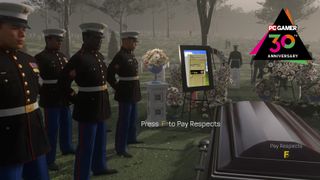
I'd like to begin this article by talking about Warhammer 40,000. Orks in 40k are possessed of a collaborative psychic power: If enough Orks believe something is true, with enough fervour, it will become true. This manifests in simplistic examples, such as go-faster stripes on the side of vehicles that actually increase their speed. And, more relevantly here, in the God-Emperor of Mankind. There's a theory that the Emperor should be long dead, and it's only the collective terror of the Orks, for whom he represents something of a boogeyman figure, that keeps him alive.
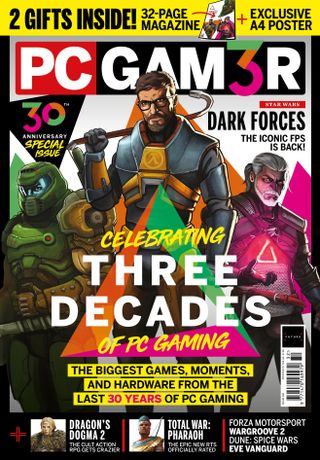
Pick up our blowout 30th anniversary issue of PC Gamer magazine, issue 390, for a look back at the magazine's own storied history and a giant feature on the last 30 years of PC gaming.
It's much the same with PC gaming. According to the examples below, our hobby has been dead or dying since the 1990s. It's natural to surmise, then, that it's only our gestalt consciousness preventing PC gaming from slipping inexorably into the vile black nothingness of oblivion. Each PC Gamer list feature buys us another day; each Steam sale a month. Henry Cavill alone accounts for around 246 days of PC gaming for the masses. And so, in an act of promethean arrogance, let's laugh at all the times that PC gaming was declared dead and survived, purely because we willed it so.
You're doing the Lord's work just by being here: reading this article buys us another hour. Make it count.
1995: Enemy at the Gates
Windows 95 launch - is Microsoft too big?: August 24, 1995
"The danger is that… the position could be used, at some point, to stifle innovation"
Let's start by going back to the launch of Windows 95 and this explanatory piece by the BBC, which asks the question 'is Microsoft too big?', which is much like asking 'is it possible to be too rich and sexy?' It's strange enough that Microsoft chose to showcase the launch of their new OS by hiring celebrity lookalikes of Jack Nicholson, Dame Edna, and Princess Di. But weirder still is the assumption that the growth and uniformity of the platform might limit creativity. There's even a brilliant moment where the report gently suggests Bill Gates should be feared, while also referencing his boyish looks. And, while some of the things in the report did come true, the short response to the question is 'no, it'll be fine—just wait till you see what Apple looks like in 20 years.'
2001: Madness and Sacrifice
Is PC Gaming Dying?: March 12, 2001
The biggest gaming news, reviews and hardware deals
Keep up to date with the most important stories and the best deals, as picked by the PC Gamer team.
"The fundamental question of PC survival comes down to this: How much profit can publishers make off of PC gamers?"
Then there was the time we asked if PC gaming was dying because [checks notes] Midtown Madness didn't sell very well. You might be too young to remember, but around the late '90s, all of PC gaming's hopes were contained within the practical but spacious trunk of this cheerful, open-world racer. This was our three-door hatchback messiah, pootling us towards salvation. In the dark hours, PC gamers would kneel by their tower units, illuminated by the baleful light of the XP screensaver, and whisper the same prayer: "Save us from oblivion, Midtown Madness."
And lo, Midtown Madness arrived, like Gandalf on the fifth day, except in this version he falls off Shadowfax while charging down the hill and breaks his hip.
I'm being uncharitable, because the linked article does provide a more nuanced overview of the struggles PC gaming faced back in 2001. But there is something delightful about providing such a deep dive into the industry inspired by middling sales of Sacrifice, Crimson Skies, and No One Lives Forever. There are some interesting takes here—especially the cost vs. sales analysis that seems especially relevant at the moment—but it also makes the broad range of choice offered by PC gaming seem like a curse, not a blessing.
2001: Xboxed In
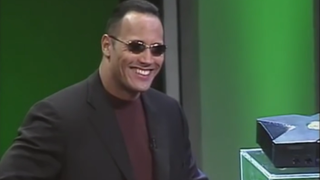
The Xbox Revolution: January 1, 2001
"In five years, if we're lucky, PC Gaming will be all but dead. The product that should deliver the first in a series of killing blows will be Microsoft's much talked about, and recently unveiled Xbox."
There's lots to enjoy here. First is the idea that the Xbox could kill anything, except perhaps by accident. It was a gigantic imbecile of a console, so vast it came fitted with detachable cables to prevent excited players from yanking it onto childrens' heads. If Lennie from Of Mice And Men was a games machine, he'd be the original Xbox. Secondly, since I'm apparently being pedantic, you can't have a series of 'killing blows'. One is traditionally enough.
There are some perceptive takes, though. The Xbox's hard drive and built-in broadband adaptor are standard issue across all consoles now, but at the time, laughably enough, it was worth calling these features out as special. That's right, children: there was a time when your consoles came without internet. A less compelling case is made for playing the Xbox with a mouse and keyboard, an act of such beastliness I wouldn't even ask an AI to generate it. None of these things, quite obviously, killed the PC. But they did improve every console that followed.
2005: Elitist Dangerous
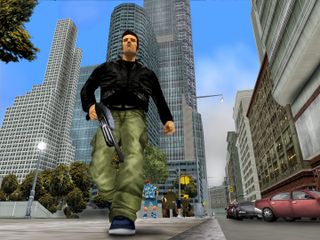
"The sooner developers realize that PC gaming is the hobby of the intellectual, not the slacker looking for a quick entertainment fix, the sooner we will begin to see our hobby return to it's [sic] roots with well thought out, inspired gaming experiences"
This one is the Mr. Mahon walks to the ring of 'PC gaming is dead' articles. I'm not sure it warrants any kind of thoughtful rebuttal, especially when one of the case studies—to use the author's own astoundingly generous description—is called 'Pulling a Rockstar'. Who better to pick as an example of creative ineptitude than the developer of the highest grossing PC game of all time? This doesn't so much read like a measured analysis of PC gaming, as the worried thoughts of someone traumatised by a falling Xbox (see above).
2007: Hasta La Vista, PC Gaming
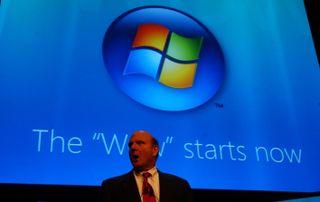
Vista shipped. So where are the new games?: June 29, 2007
"At present, there are just a handful of titles that are support [sic] DirectX 10, the application processing interface that tells the video card in your PC how to draw the graphics onscreen. And to date, there are only two Vista-only titles — one of which is "Halo 2," a three-year-old Xbox game."
Do you remember when Windows Vista killed gaming? NBC does. Vista was the wretched, throbbing pupae from which the beautiful butterfly of Windows 7 emerged. It's only the existence of Windows 8 and Windows ME that stops it from being remembered as the most cursed PC operating system of all time. That's why we all remember Vista's year of release, 2007, as the moment we turned off PC gaming's life support forever, rather than the release of Bioshock, Portal, Team Fortress 2, Modern Warfare, S.T.A.L.K.E.R. Shadow of Chernobyl, Crysis, and The Witcher, to name but a few. What a year that could have been, if the hobby hadn't lain decaying like offal in a butcher's drain, all thanks to Windows bastard Vista. Oh well.
2010: Out of Steam

Five reasons why Steam will destroy the PC games industry: May 26, 2010
"A bit too competitive to Half-Life? No distribution. We don't like Match-3 games? No distribution. We're not sure that anyone will want a game based on farming? No distribution."
This one blames the imminent death of PC gaming on Steam: the massive and ubiquitous gaming platform that offers nearly 30,000 games to millions of paying customers. It argues that monopolies, and via extension Valve, will stifle creativity and smother smaller developers. Best of all is the speculation that Steam wouldn't distribute farming games on the basis that nobody would want them. I'm writing with the benefit of hindsight, obviously, but a cursory glance at the list of games on Steam reveals the opposite problem: if anything, there's too much creativity. If you can think of it, there's a chance someone has turned it into a frothing, horny visual novel. It's enough to make you never want to be creative again.
On the other hand, the author is correct about Valve remaining the platform of choice. Even in the face of timed exclusives and free games, the PC gaming audience remains loyal to Steam, and the Epic Store, for instance, still isn't making any money. As far as it's possible to tell, this hasn't yet resulted in the death of PC gaming; just lots of frustrated sighs when you have to remember your Origin login.
2013 A pirate's death
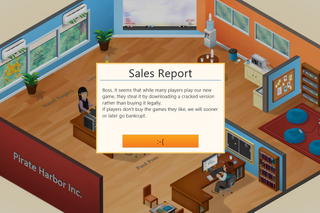
"Piracy is Killing the PC" – Game Devs Predict a Grim Future for PC Gaming: June 19, 2013
"Piracy isn't visibly disrupting anything, and yet if gamers don't act, PC gaming could go the same way as gaming on Macs – near nonexistent."
This article is enjoyable, mainly because it includes headers in quotes, as if someone important and influential said it. I might start trying that myself.
"Matt Elliott looks like a fire-damaged LEGO figure of Michael C. Hall"
There's really not much more to say about this one. Piracy is bad for everyone apart from the pirates. DRM is annoying. 10 years on and we can confirm that PC gaming isn't dead from either cause.
2023: AAA Real Monsters
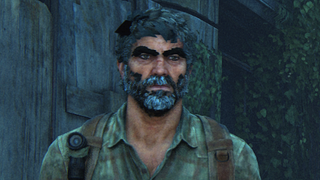
It pains me to say, but it’s officially a bad time to be a PC gamer: May 3, 2023
Let's finish with a recent one. It is, apparently, the worst time ever to be a PC gamer. The author blames the growing proliferation of shoddy ports, citing a number of AAA games that have had problems running on PC. Redfall's UI breaks if you use a mouse. Star Wars Jedi: Fallen Order requires multiple launchers to run. The Last of Us: Part 1 was an absolute nappy fire of a PC conversion. On top of this, they mention the cost of PC upgrades, review bombing, and misleading hardware specifications.
For the most part, they're absolutely right. All of these things are indeed terrible, and we've had our own gripes about recent port trends. But if I'm honest, they feel more threatening because they're so current, as every iteration of hyperbolic doom-mongering somehow hasn't prepared me for this moment. Perhaps the truth is that the end is nigh… but it's also been nigh for the past 30 years.
Just like the space orks, our shared belief will keep PC gaming alive through any hardship. Hold onto hope. Trust in the benevolence of the God-Emperor.
Most Popular


